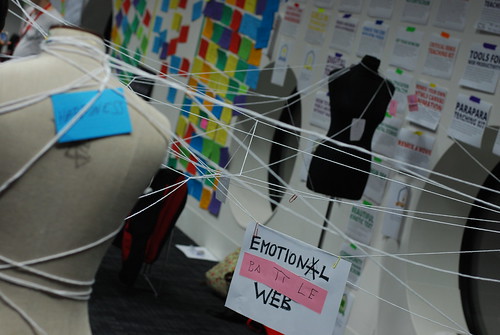Description
This Teaching Kit is designed to establish trust in live events and demystify facilitation techniques. It can be used to prepare people to design their own participatory, learner-centric events.
Over the course of the training, we'll learn how to see ourselves as a community, how to build for specific audiences and how to support each other.
Learning objectives
Learner will be able to:
- facilitate making as learning
- run an event
- make things with Webmaker tools
- help others use Webmaker tools
Learner will understand that:
- There's a global community to help them organize local initiatives.
- Collaborative participatory learning experiences are about community and learner centric design.
- Facilitating and pacing the event is essential to sustaining participant engagement and energy levels.
- All facilitation is learning exercise in itself.
- We have cultural notions of what learning is supposed to look like.
- the Web is made out of building blocks that they can rearrange to create new things through an iterative process.
- HTML is a language used to tell computers how to build webpages so that humans can consume them
- CSS means cascading style sheets
- Parts of a webpage include HTML, CSS, graphic assets and text content
- The combination of an opening tag and its corresponding closing tag and the content in between is called an element
What you'll make together
On Day 1, we'll use all three of the Webmaker tools to help learners think about their local events. We'll make:
- An X-Ray Goggles remix of a site to include initial thoughts on event type, target audience, logistics and potential partners.
- A Thimble event invitation and promotional page.
- A Popcorn video about what participants have learned about facilitation.
Preparation
You need a large room that can comfortably fit all your participants in a circle. Small break out rooms are a plus. Optional: a projector to show demos.
It is also recommended to have a team of co-facilitators who can help shape and run the agenda with you. We recommend 1 facilitator to 5 participants.
Assessment and review
-
Discussion questions:
- Who do you imagine your audience to be?
- How can your #teachtheweb work connect to the rest of your calling?
- What excited you the most?
- the least?
- Sharing. Have you posted your work to the Webmaker G+ Community? Did you tweet with the #teachtheweb hashtag? Are you a member of the Webmaker Newsgroup?
Assessment criteria
- participate?
- collaborate?
- help others?
- outline a reasonable Maker Party plan?
- try to make things with Webmaker tools?
Agenda
- 20 mins Introductions and Setup
- 1 hour Role Playing: Teach in Pairs
- 45 mins Setting Learner Centric Objectives
- 10 minutes Break
- 5 mins XRay Goggles Demo
- 30 mins Remixathon: Brainstorm your ideal event
- 10 mins Thimble HTML Intro
- 30 mins Promote Your Party with Thimble
- 15 mins Shareouts!
- 1 hour Lunch
- 15 mins Evolution for Geeks
- 5 mins Popcorn Maker Demo
- 1.5 hours Reflecting on Facilitation with Popcorn
- 30 mins closing circle
